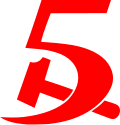Campaign for a new worker's international
The phrase Fifth International refers to the efforts made by groups of socialists and communists to create a new workers' international.
| Part of a series on |
| Socialism |
|---|
 |
| Part of a series on |
| Communism |
|---|
 |
The phrase Fifth International refers to the efforts made by groups of socialists and communists to create a new workers' international.
There have been several previous international workers' organisations, and the call for a Fifth International presupposes the recognition of four in particular, each of which regarded itself as the successor to the previous ones:
Although a reunified Fourth International still exists, the fragmentation of Trotskyism has resulted in the call for a fifth international.
In November 1938, two months after the founding congress of the Fourth International, seven members of the Spanish Workers' Party of Marxist Unification on trial in Barcelona denounced the international and declared their support for a "fighting Fifth International". [1] The Argentine Trotskyist Liborio Justo called for a Fifth International when he broke from Trotskyism in 1941. [2] Another call for a Fifth International was made by American activist Lyndon LaRouche after leaving the Spartacist League in 1965. [3] Later, a "Fifth International of Communists" was founded in 1994 by the Movement for a Socialist Future and several small former Trotskyist groups. In 2015, the Revolutionary Anti-Imperialist Movement called for the formation of a Fifth International based on Maoism–Third Worldism. [4]

In 2003, the League for a Revolutionary Communist International, originally founded in 1989, called for the formation of the Fifth International "as soon as possible – not in the distant future but in the months and years ahead". [5] The group became the League for the Fifth International (L5I), which as of 2010 had sections in Austria, the Czech Republic, Germany, Pakistan, Sri Lanka, Sweden, the United Kingdom and the United States. [6] L5I describes itself as "an organization of communists and Trotskyists". [5] L5I campaigns in the European Social Forum and the international labour movement for the formation of a new international. The Communist Workers' Group in New Zealand, which splintered from L5I, also argues for a Fifth International.
Hugo Chávez announced in 2007 that he would seek to create a new international: "2008 could be a good time to convoke a meeting of left parties in Latin America to organise a new international, an organisation of parties and movements of the left in Latin America and the Caribbean". [7] [8]
The League for the Fifth International critically supported the proposal. [9]
Poet Allen Ginsberg mentions a Fifth International in "Footnote to Howl", the final part of his poem "Howl". [10]
The card game Illuminati by Steve Jackson Games features the Fifth International as a "communist" and "conservative" group. [11] [12]
Robert A. Heinlein references a Fifth International in the novel The Moon Is a Harsh Mistress . While the novel's characters are discussing their different political ideologies as they attempt to design a revolution, the character Wyoming Knott identifies herself as a "Fifth Internationalist" but states she is "no Marxist".
During the trial Poum defendants stressed that, while they 'admired Trotsky,' they regarded his Fourth International as too academic and favored a fighting Fifth International.